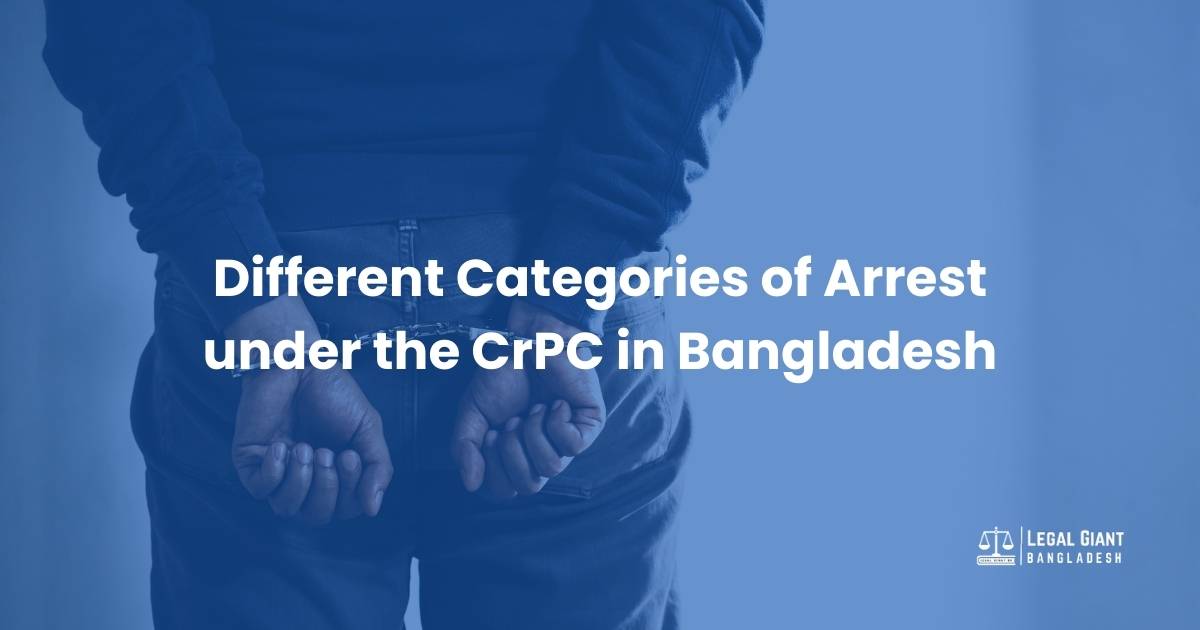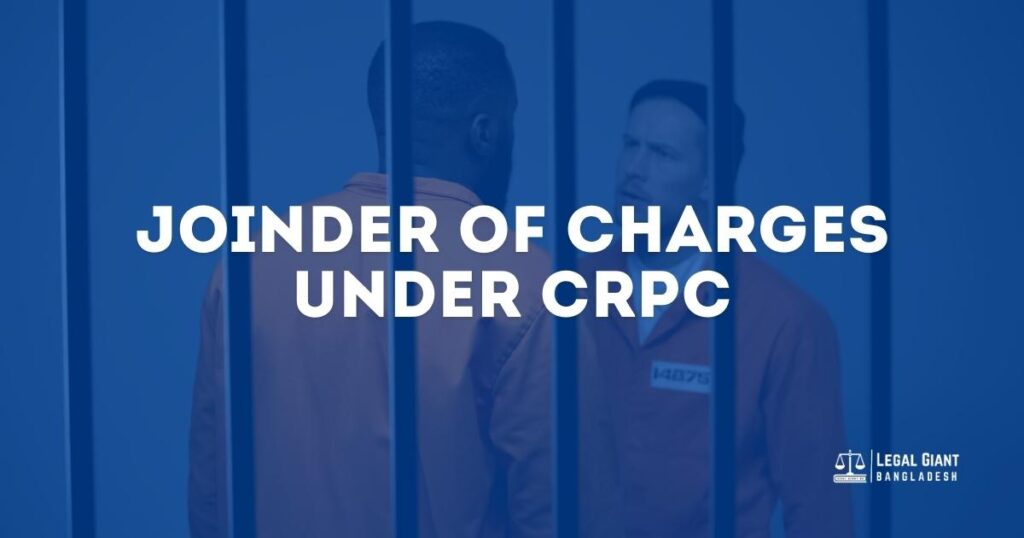Arrest plays a critical role in the criminal justice system, as it ensures that law enforcement agencies can take individuals into custody when they are suspected of committing crimes. The Code of Criminal Procedure (CrPC) of Bangladesh, which governs the process of arrest and detention, outlines various categories of arrests based on the nature of the offense, authority, and urgency. These categories are designed to ensure that arrests are made in accordance with the law while protecting the rights of individuals.
In this article, we will explore the different categories of arrest as defined under the Code of Criminal Procedure (CrPC), along with the relevant procedures.

Arrest with a Warrant (Section 75)
Under the CrPC, one of the primary methods for making an arrest is through the issuance of an arrest warrant. This occurs when a magistrate is satisfied that a person has committed an offense and needs to be taken into custody.
Key Features:
- Authority: The arrest must be authorized by a magistrate.
- Procedure: A formal arrest warrant is issued, specifying the person to be arrested, the nature of the offense, and the circumstances.
- Rights of the Accused: The individual has the right to be informed about the reasons for their arrest and to challenge it in court.
This category of arrest is typically used for non-cognizable offenses or where the suspect is not believed to be a flight risk. For more details on the procedure, see our article on Procedure for Arrests.
Arrest without a Warrant (Section 41-42)
The second category of arrest occurs without a warrant, typically when the police officer has sufficient grounds to believe that an individual has committed a cognizable offense, or in situations where immediate action is necessary.
Key Features:
- Authority: A police officer can arrest without a warrant in cases of cognizable offenses.
- Urgency: This type of arrest is often carried out in urgent situations, such as when there is a risk of the suspect fleeing or destroying evidence.
- Circumstances: Police may arrest without a warrant if they have a reasonable belief that a crime has been committed, or if the suspect has been found committing the crime.
Arrests without a warrant are often related to serious offenses where delaying the arrest could pose a risk to the investigation or public safety.
Preventive Arrest (Section 151)
Preventive arrest is a form of arrest made not because a person has committed a crime, but because they are suspected of being about to commit an offense. This category is intended to prevent harm or disruption to public peace and safety.
Key Features:
- Authority: A police officer can arrest without a warrant if they believe that a person is about to commit a cognizable offense and their actions could lead to a breach of peace.
- Procedure: Preventive arrests are often used in public safety situations, such as preventing public disturbances, riots, or acts of terrorism.
- Rights of the Arrested: The detained person must be informed of the reasons for their arrest and their right to be brought before a magistrate within 24 hours.
Preventive arrests are used as a proactive measure to protect the public and prevent crimes before they occur.
Arrest for Bailable Offenses (Section 436)
In the case of bailable offenses, the arrested person is entitled to be released on bail once they are arrested. This type of arrest is categorized based on the nature of the offense, where the law allows the arrested individual to seek bail.
Key Features:
- Bail Availability: The arrested individual can be granted bail immediately upon arrest or soon after.
- Procedure: The arresting officer is required to inform the individual of their right to apply for bail.
- Nature of Offense: Bailable offenses are less severe, and thus, the individual is allowed the opportunity to regain their freedom pending further legal proceedings.
Arrest for Non-Bailable Offenses (Section 437)
For non-bailable offenses, an individual arrested may not be able to immediately secure bail. These offenses are typically more serious, and the decision to grant bail is at the discretion of the court.
Key Features:
- Court Discretion: The arrested individual may only be released on bail if the court finds sufficient grounds.
- Seriousness of the Offense: Non-bailable offenses often include violent crimes such as murder, rape, or armed robbery.
- Procedure: The arrested person can be kept in custody until they are presented before a magistrate, who will determine whether to grant bail.
This category focuses on ensuring that serious offenders remain in custody pending trial to prevent further harm or flight.
Arrest for Cognizable Offenses (Section 41)
A cognizable offense refers to a serious crime for which the police have authority to make an arrest without a warrant. The law allows the police to arrest individuals without a warrant if they have reasonable grounds to believe that a cognizable offense has been committed.
Key Features:
- Immediate Arrest: Police officers can arrest the accused without seeking approval from a magistrate.
- Offenses Included: Serious crimes like theft, assault, or murder typically fall under this category.
- Procedure: The police must inform the arrested person of their rights, including the reason for the arrest and the right to consult a lawyer.
Cognizable offenses are treated with utmost seriousness in Bangladesh’s legal framework, and arrests in these cases are swift to ensure justice is served.
Conclusion
Understanding the different categories of arrest under the Code of Criminal Procedure in Bangladesh is essential for comprehending how law enforcement operates in the country. Whether it is an arrest with or without a warrant, for bailable or non-bailable offenses, or preventive arrests, each type is governed by specific legal provisions to protect the rights of individuals while ensuring the effective administration of justice.
For more detailed discussions on the processes involved, check out our resources on Procedure for Arrests and Arrest and Detention.
FAQs
Can the Police Arrest Me without A Warrant in Bangladesh?
Yes, the police can arrest you without a warrant if they have sufficient evidence or belief that you have committed a cognizable offense, or in urgent situations.
What Is a Preventive Arrest?
A Preventive Arrest Is Made to Stop a Person from Committing a Crime, Typically to Maintain Public Order and Safety.
What Happens if I Am Arrested for A Bailable Offense?
If Arrested for A Bailable Offense, You Are Entitled to Be Released on Bail, Either Immediately or Shortly After the Arrest.
How Long Can the Police Detain Me After an Arrest?
Under Section 57 of The Cr Pc, an Individual Must Be Brought Before a Magistrate Within 24 Hours of Arrest, Except in Exceptional Circumstances.
Can I Challenge My Arrest in Court?
Yes, you have the right to challenge your arrest in court if it is made unlawfully or without proper authority.


